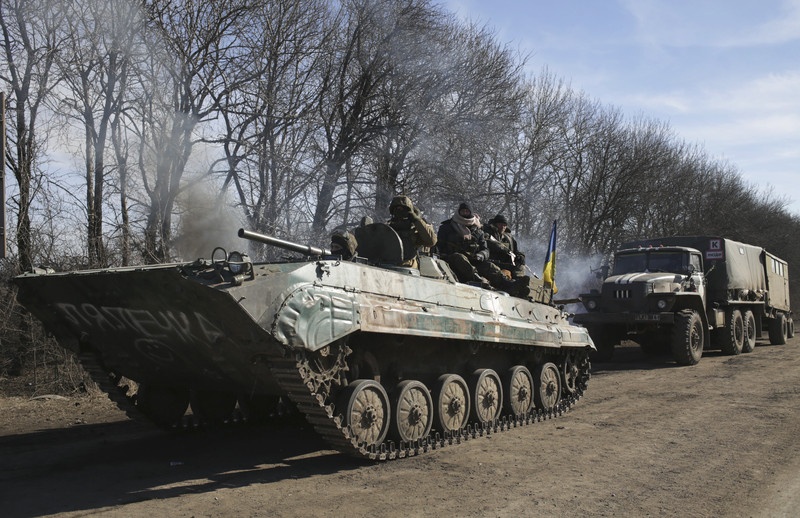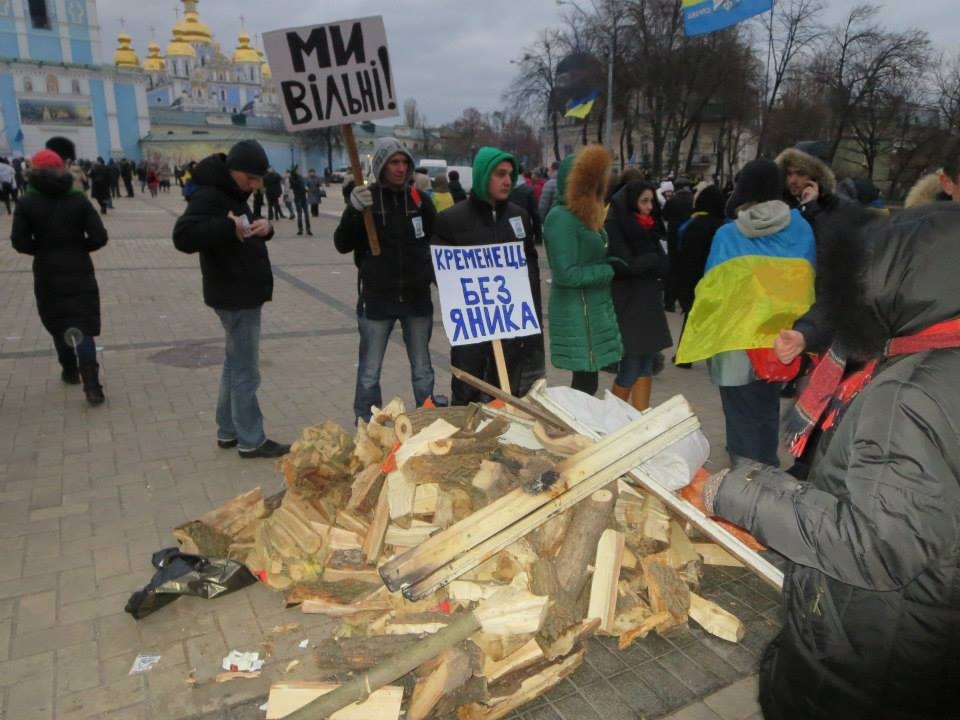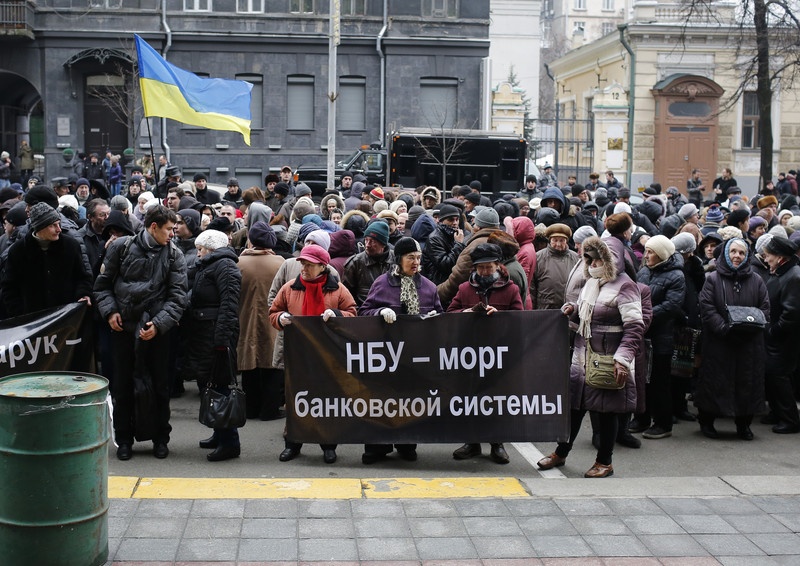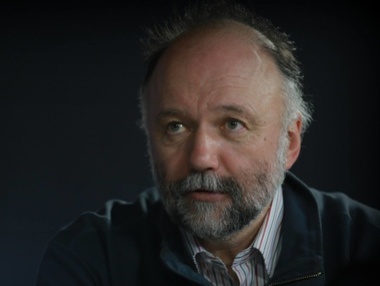The works of the Ukrainian writer, script writer and journalist Andrey Kurkov are published abroad more often than in Ukraine. His "Picnic on the Ice" became the first book from the CIS countries to be shortlisted among top-10 European bestsellers. Kurkov has been a member of the English PEN-Club since 1998. He periodically writes articles on the events in Ukraine for Western mass media. His political essays and prose help European readers to understand what is going on in the country that is actually covering the EU eastern borders.
Kurkov put off work on two books about Ukraine and Lithuania because of the Revolution of Dignity. It was not very easy to get back to working on them. In the writer’s opinion, the current reality is much more dramatic than literature. And the endless flow of news and events prevents from concentrating.
Kurkov has a tight working schedule: meetings with readers in Kiev and the Austrian city of Linz. On returning from Europe he will go on a two-week trip about Donbass. Kurkov met the GORDON correspondent on Maidan Nezalezhnosti right after the presentation of his "The Maidan Diary."
The book was first published in French in May 2014. Then it was translated into English, German, Italian, and Japanese... "The Diary" appeared in our shops just several days ago. One of the reasons for such a delay is poverty of domestic book publishers and weak book market. On the other hand, Kurkov admits, he was writing the diary specially for the Europeans so that they could understand the essence of what happened during the Euromaidan.
Will this understanding help European politicians and citizens to take a more defined position in their estimations of the Ukrainian-Russian military conflict? The writer doubt it. He considers that the EU will support Ukraine economically, but it will be afraid to provide military assistance to avoid provoking Russians.
Ukraine won this war in advance: it defended its independence from Russia
– What important events are taking place in your life?
– Together with my colleagues Sergey Zhadan and several young writers are going to Donbass via Kharkov. I think the trip will not be an easy one as we will have meetings with the military and local citizens. On the other hand, we will feel the atmosphere of the front-line zone, we will drive through the cities that suffered from the war. Of course, people have other troubles than art there, and we will not discuss literature or books, but how to live on and what will happen to Ukraine.
– And what do you think will happen to Ukraine?
– Unfortunately, it does not depend on us. It depends from one person in the east and a few people in the west. If the West does not find a way and willpower to force Putin to moderate his appetites, Ukraine will be worn out because all resources will go to war. We won this war in advance: we defended our independence from Russia. However, we have to endure all other ordeals in order to achieve the final victory.
I think that the following two or three years will be the most difficult. Even if an unstable truce is established, Donbass will still shoot and attack us until it runs out of ammunition and soldiers. And it will never run out of them. Factories and mines are destroyed in the region, so that people would have only one way to earn their living – to fight against Kiev for money.
Only some five years later when everybody is tired of the war, a dialogue will begin. By this time, the front line may be a border that we will protect to keep away saboteurs, arms, and all the chauvinistic infection.
– Will the problems of the Crimea remain secondary at the background of the war in the Donbass?
– There will be a pause of around 10 years in the relation between the Crimea and Ukraine. We will not return the peninsula by military means – the forces are not equal. Only Western pressure remains. The main thing is that Ukraine should continue to regard the peninsula as Ukrainian and not sign any peace agreements consenting to the annexation, it should demand from the world not to recognize these territories as Russian.
I believe that the new Russian elite will try to restore relations with the world after Putin. The annexed peninsula will be one of the obstacles, and they might be some sort of a compromise agreement. In the meantime, the Crimea is a doomed place. The Russian Federation can only make a large military base there. Even Transnistria is now in better conditions than the occupied Crimea. The inhabitants of Transnistria have Moldovan passports and can go on earnings. Nothing similar will ever be in the Crimea.
The West is afraid to help Ukraine and fight against Russia because no one knows what Putin is capable of. And he takes advantage of it
– The ability and willingness of Western countries to provide military assistance to Ukraine already cause doubt. Why do not Europeans and Americans hurry to supply arms to the Ukrainian army?
– The West will not provide radical military assistance to Ukraine or lead an open war. It does not want to become part of the military conflict. As a matter of fact, however, it is not a conflict between Ukraine and Russia, but rather a conflict between Russia and the West. Ukraine serves as a European sacrificial lamb in it.
Hopefully, Russia's goal is unattainable, I mean return of Ukraine under its economic and political control. To do this, Kiev and the whole country must be seized, and the politicians must be replaced with pro-Russian ones. If Russia, roughly speaking, eats up Ukraine, Moldova will be the next followed by Estonia, where the question with Narva will arise. It can be easily estimated. The Russian Federation has never signed any agreements on demarcation of borders with Estonia, Belarus, and Ukraine. This means that Russia does not recognize the existing borders and will probably want to change them to its advantage. When the Estonian parliament voted a law on unilateral demarcation of borders, the Russian Foreign Ministry said that it did not recognize this law.
The EU should be ready for such a development. However, European politicians hope that they will not be in office by the critical time, they will not be re-elected. The European Union is afraid to get into a military conflict with Russia, because no one knows what Putin is capable of. And he takes advantage of it.
 Ukrainians can only rely on themselves in the war against Russia. Help from abroad will not come soon. Photo: ЕРА
Ukrainians can only rely on themselves in the war against Russia. Help from abroad will not come soon. Photo: ЕРА
Not everything is simple for America. The Ukrainian-Russian conflict at the geopolitical level is a war for influence in the Middle East and in the world politics. Russia supports Syria and Assad, Iran, North Korea, and Venezuela. It does it in contrast to the United States that has good relations with Kuwait, Saudi Arabia, Colombia, and Panama.
If Ukraine loses, America will lose, too. This is obvious. But Obama is not a typical American president. When Ashton Carter was appointed Secretary of Defense, Obama asked him not to react to Putin for two weeks and not require drastic decisions on new sanctions.
It becomes apparent that it is not worth expecting quick and real help from Europe and America.
– You often communicate with European citizens, Western publishers and politicians. Do they understand what is happening in Ukraine? Are they concerned with this topic?
– Certainly. Although not everyone understood what had happened. I can judge it by the reaction to "The Maidan Diary". Before November 2013, I wrote essays about Ukraine for an Austrian publisher to show the difference between our country and Russia. And when the Maidan started, I realized that I could not write essays and suggested keeping a diary. I wrote a text every day and sent it to a translator. The first edition of the book was published in French in May. Then it was translated into other languages. There is a great interest, including among journalists and politicians. I recently flew in an airplane with the Prime Minister of Sweden Carl Bildt. He said that the book is useful and helps to understand the Ukrainians and the Maidan.
Maidan was partially a revolt against colonization of Ukraine by Donetsk
– What do you consider the most important achievement of the Maidan?
– Consolidation of society. Previously, we had a contest "Who is the best Ukrainian". Finally, it was closed down. There was a community of people who live in the same territory and believe in the future of this territory as an independent country.
There was a feeling that it was not necessary to tie the nation with one language. It is cosmopolitan and multicultural. The fact that half of Russian-speaking volunteers and soldiers fight for Ukraine is confusing for the Russian propaganda.
If we can create a common cultural national space covering hundreds of thousands kilometres from border to border, everything will be fine then. The question of language will no longer be able to divide us. Otherwise, another country will occupy the empty space and turn it into foreign territory, which happened to Donbass.
Little is spoken about it, but in reality the Maidan was partially a revolt against colonization of Ukraine by Donetsk. I know many stories about the clash of mentalities and cultures of regions. For example, when a 28-year-old guy from Donetsk was appointed the Head of Lvov Customs to establish new orders to pump money and send it to Donbass.
 Kurkov: Maidan was partially a revolt of the Ukrainians against the Donetsk occupation. Photo: Andrei Kurkov / Facebook
Kurkov: Maidan was partially a revolt of the Ukrainians against the Donetsk occupation. Photo: Andrei Kurkov / Facebook
Donetsk expansion itself was a repetition of history of Western Ukraine after World War II. Soviet officers from other republics were sent there then to thin local nationalism and turn it into some other entity. In fact, it was an attempt of occupation. It is one of the reasons why people from western regions made so much sacrifice in the struggle at the Maidan.
A third Maidan will not offer a new leader. People want to vote for those who they know. And they basically know the old political elite
– The public is dissatisfied with the government again and there are talks about a third Maidan already. Do you believe in the possibility of another revolution?
– Ukrainians choose a hetman or a president, and the next day they start scolding him: he has been in power for three hours and has not done anything. It's normal. We have a boiling society. Everyone has an opinion and considers it important. If we were organized and quickly came to a common idea, we would be another Russia. They elect a tsar and adore him until he dies.
As far as relation to power is concerned, the Italian model is close to us, because there is the same openness to corruption and willingness to quickly change leaders in Ukraine. There is a permanent crisis in Italy, and there is no permanent sympathy towards politicians. A permanent crisis and a war against active politicians are starting, appeals to organize a new Maidan can be heard.
Even if there are some demonstrations, they will not receive much support. We must understand that another Maidan will not offer a new leader. A novice must be legitimized through elections. And people want to vote for those who they know. Basically, this is the old political elite.
– However, a sharp deterioration in living standards may trigger social unrest, or do you think that the patriotic spirit is so strong that people will endure any economic problems?
– We continue to receive loans and we will not be allowed to reach the economic bottom. Otherwise, there will be a rebellion, not a revolution. It will be difficult to unite into one state what the rebellion will leave after itself. They understand it in Europe.
 Kurkov: Social demonstrations will take place, but they will hardly lead to a third Maidan. Photo: ЕРА
Kurkov: Social demonstrations will take place, but they will hardly lead to a third Maidan. Photo: ЕРА
We are in trouble because we have not struggled against our own parasitism for 23 years. Poor layers of the population were bought by the political leaders with different benefits and pittance. People were guaranteed to be poor, but not poverty-stricken. They considered it stability, so they had to vote for the government that promised benefits, partly pays for gas, electricity, and gives some money. It ate up the budget and did not give a chance for the development of human consciousness. People did not understand that they could be masters of their own destiny, risk, and change the way of life and the place of residence.
One of the main problems in Ukraine and the cause of problems in Donbass is weak internal migration. When a person goes from Donetsk to Volyn, or the Crimea, or Odessa because there is a good job there, if he sells an apartment and buys it elsewhere, this will be the willingness to change. Even the youth do not have such wishes. The backbone of the immovable population that are expecting benefits prevent from building a normal state with their passivity. Without migration, we will not mix and become unified society, but will keep the worst in every single region.
Anarchic development of the Ukrainian culture made it extremely resistant to bad political weather
– What do you think about the idea of the Minister of Culture Vyacheslav Kirilenko to finance only official celebrations and events for ATO fighters?
– The Ministry of Culture has never given any money to any single figure of modern art. Before the Maidan and immediately after it, there were plans to reform the Ministry of Culture and create a mixed, public-private system of project financing. One can forget about the cultural process because of war now. All the money goes to the front.
If the war lasts for years, there will be a need for cultural propaganda teams. People who will be living at the front and feed insects in the trenches will need to be saved morally. Art is what helps in such cases, not elitist art, but popular, easy for understanding to any person.
– Must the Ukrainian culture be saved?
– A drowning person needs to be rescued. The Ukrainian culture is not even swimming. It must be raised, reformed and made available. Officials should become aware that culture is not just folk songs and dances, museums, theatres, and other accounting activities. Above all, it is the cultural image of the country. We do not have world-popular museums, we do not have Metropolitan Opera or La Scala. But we have modern art, our rock, our classical music (that we do not know), and literature. And they should be promoted.
By the way, Russia has always supported all kinds of modern art. Both Putin and Surkov and others realized that the negative political image of the country can be compensated by the great Russian culture. A lot of money has been earmarked on the participation of Russian writers in all international exhibitions as guests of honour, on exhibitions of Russian art at foreign museums, on constant touring of the Bolshoi and Mariinsky theaters around the world, on festivals of Russian culture in different countries. The Russian Federation finances people who help promote Russians abroad, it gives awards to translators so that they would do more translations of Russian authors.
Nothing like this has ever existed in our country. Anarchic development of the Ukrainian culture has made it extremely resistant to bad political weather. Another thing is that not everybody can survive under such circumstances. For example, about a thousand writers work and publish a book a year in England. The literary process and the book market work fine. We have the same number of potential readers, but only two or three dozen authors. It turns out that Ukraine lacks 980 writers for a full-fledged literary process to begin.
People are the same everywhere. The percentage of those who will be frightened and silent is ten times greater than those who will not be afraid to express their opinion
– Why do the majority of Russian cultural figures prefer to ignore the problems faced by society and not to express their opinion on the war in Ukraine?
– They have been brought up on the money from the government. They never depended on the quality of their work. The writers who are known and read abroad did not sign the letters to Putin. The rest of the signatories are published only in Russia. They are afraid of losing the feeding trough, so they hide and keep silent.
I know this psychology very well. In 1992, during the war in Yugoslavia, I was driving from Zagreb to the bombed Dubrovnik at night. There were roadblocks and documents checks every 15 minutes. I had a Soviet passport with a Ukrainian stamp. Everything seemed fine, but I was pulled out of the bus by the Dalmatian police near Dubrovnik and arrested as a Russian spy. There were 12 passengers in the bus, all men. I asked if anyone could speak English? Everybody was silent. I could hardly find a fax from the person who invited me. When I was released and the bus drove away from the roadblock, passengers started speaking English: They are so stupid, these Dalmatian policemen! They kept silence when I was being pulled out. And when the danger had passed, they could start talking.
People are the same everywhere. The percentage of those who will be frightened and silent is ten times greater than those who will not be afraid to express their opinion.
Putin will remain in power until he dies or until he is overthrown
– It is emphasized in the Wikipedia article that you are Russian by nationality. Do you feel a Russian person?
– I feel a citizen of Ukraine. My Russianness is my Russian language, good knowledge of the Russian culture and literature of a century ago. I never wore a Russian shirt and boots, I never danced to "Dark Eyes" or led a bear on a chain. So I am probably as Russian as Joseph Brodsky, as Russian as Vladimir Voinovich and Vladimir Sorokin.
I have made several trips to Russia in the recent years and have felt abroad. We are very different. Russian mentality is based on collectivism, and Ukrainian one on individualism. Therefore, we have 186 parties, and they have one party in power. The monarchy tradition was not interrupted even during the Soviet era there. Every secretary-general was a monarch but for Khrushchev – he was overthrown. All the rest were re-elected and remained in office until death. Putin has revived this tradition, and now he will remain in power until he dies or until he is overthrown.
 Kurkov: I am not a corporate person. I am on my own. It is not the Russian way of behaving. Photo: Andrei Kurkov / Facebook
Kurkov: I am not a corporate person. I am on my own. It is not the Russian way of behaving. Photo: Andrei Kurkov / Facebook


 -3 Kyiv
-3 Kyiv



